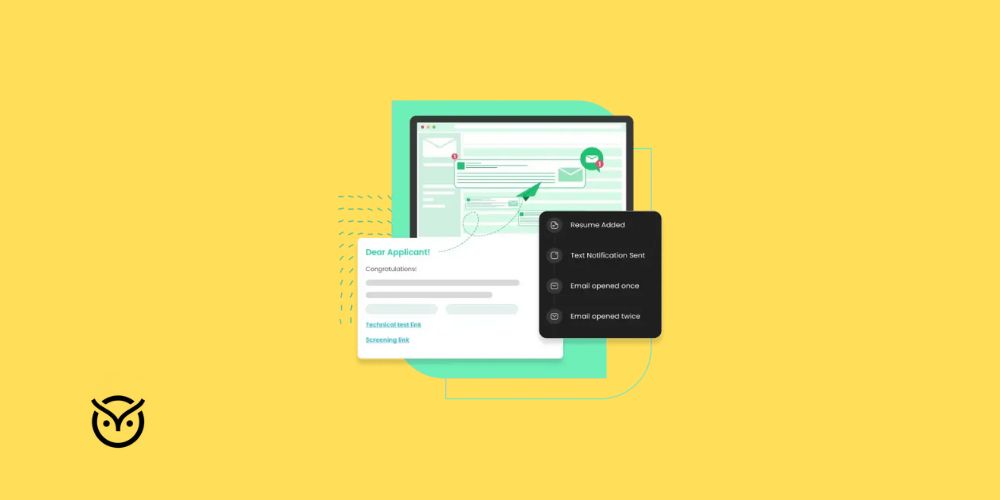
TL;DR
- Recruiters handle initial screening interviews.
- HR Generalists assess soft skills and culture fit.
- HR Managers lead final-round interviews.
- HR Coordinators manage scheduling, not interviews.
- Hiring Managers test technical and job-specific skills.
- Department Heads and Team Leads join mid to senior-level interviews.
- Peer interviews assess collaboration and team fit.
- Senior HR roles are interviewed by internal leadership or external consultants.
- Interviewing is a shared task across HR and departments.
All a recruiter wants is to hire the right talent for their organization and interviews are a key to unlocking this potential. But many recruiters and job seekers are in the dark when it comes to the question, “who conducts interviews in HR for staffing?”.
What immediately comes to mind is that HR handles it but reality is another story. Even if HR does handle it, there are multiple roles and responsibilities for each individual. But this blog aims to inform you about who conducts interviews in HR and how different professionals help in the process of staffing.
Who Conducts Interviews in HR for Staffing?

According to Forbes, for every 100 employees there should be 1.4 HR staff. This means that HR teams should be highly strategic and efficient and should be able to deal with multiple employees at a time, even when it comes to the hiring of new talent. This brings us back to the question of understanding who conducts interviews in HR for staffing.
We know that staffing is HR’s department but what we need to learn is who specifically conducts interviews in HR for staffing. Let’s explore the key HR roles to get the know-how about how staffing actually works.
HR Manager
HR Managers oversee the overall hiring strategy and only make an appearance in the final interview rounds. They collaborate with department managers to select the most qualified individuals and ensure they are in accordance with the organization’s long-term vision and values.
It’s not the HR Manager’s job to conduct every interview but at the end of the day the final hiring recommendation goes from their side. They make sure that there aren’t any inconsistencies in the recruitment process. Their particular involvement is in the executive-level hiring where long-term strategic alignment is a priority.
HR Generalist
A variety of functions are performed by HR Generalist which involve employee relationship management, benefits administration, and hiring. They use the situational and behavioral method of interviews during staffing which helps in the evaluation of soft skills. This helps in deciding whether the candidate belongs in the company culture. They also collaborate with the hiring managers to strategize the interview process.
They have general responsibilities and tend to specialize in mid-level jobs instead of highly technical or executive-level positions. They play a vital role in the transition from interview to onboarding.
Recruiter/Talent Acquisition Specialist
The initial HR Professional a candidate will encounter is the Recruiters or Talent Acquisition Specialists at the time of hiring. Recruiters are like matchmakers that find the best matches between the desirable employers and skilled workers.
These specialists screen resumes and pick out applicants after which they conduct initial interviews to check qualifications and interests. If you pass through this process then you’re passed on to the HR Managers and hiring teams.
HR Coordinator
All that has to do with scheduling candidate-interviewer meetings, informing applicants of the next steps, and coordinating documents regarding hiring decisions is handled by the HR Coordinator. You won’t find them conducting interviews but you sure will find them managing it.
Who Else Might Interview Candidates?
So we addressed the question, “Who conducts interviews in HR for staffing?” But did you know that it’s not always HR who conducts interviews for hiring. Besides HR, there is a list of additional stakeholders you need the approval of before you can get hired.
Hiring Manager (Non-HR)
The interview style of Hiring Managers is to evaluate your technical and job-related competencies. Through these interviews they approve or disapprove of the candidate and provide the final hiring decision critical input.
Department Heads or Team Leads
Department Heads or Team Leads can be involved in interviewing for mid-level and senior positions. They help in assessing candidate-team fit, evaluate leadership potential, and give team integration feedback.
Peer Interviews
Ever visited a company where your potential colleagues interview you? Well, that’s exactly what Peer Interviews mean. This method helps in the evaluation of interpersonal and collaboration skills, offers feedback on team dynamics and culture, and provides the candidate with a sense of what it would be like to work at the company.
Who Interviews for HR Roles?

The hiring process is not only for the external candidates but for HR professionals as well when there is an opening for internal positions. You might be wondering, “But who conducts interviews in HR for staffing when HR staff members themselves are being replaced?”
Internal Leadership
Senior HR roles are interviewed by the CEO, COO, or VP of HR. They look for strategic alignment with organizational objectives, experience in dealing with sophisticated HR functions, and leadership capabilities in leading HR teams.
External HR Consultants or Advisory Boards
Sometimes to avoid bias when hiring for specialized knowledge roles, especially senior level HR positions, the candidates are interviewed by external HR consultants. They are usually required when firms are in the process of restructuring or cultural transformation, and there isn’t an internal HR function.
Peers in HR and Cross-Department
Cross departments such as finance, legal, or operations teams might also interview HR professionals when it comes to a HR job that deals with compliance, compensation, or employee relations.
Tools & Techniques Used by HR During Interviews

Let’s discuss the tools and techniques that HR professionals use to make the best hiring decisions.
Structured vs. Unstructured Interviews
There are usually two types of interview methods used by HR professionals which are:
Structured Interviews: A set of standard questions asked across all the interview candidates so that it is easy to evaluate them on an objective or scorecard basis.
Unstructured Interviews: These are flexible questions that flow as the interview goes on and they are used to gauge a candidate’s personality, creativity, and on-the-spot problem solving skills.
Behavioral and Situational Questions
Behavior and situational questions help to guess how a candidate might do at work. HR professionals use these questions to look at what an individual has done before, how they fix problems, and the way they deal with work issues.
Behavioral Questions: “Tell me about an instance where you had to handle a tough client. How did you manage it?”
Situational Questions: “Let’s suppose you have a tight deadline and limited resources. How would you prioritize your tasks?”
AI-Based Screening and Interview Assessments
The way we conduct interviews is changing with the advancement of technology. AI is taking over tasks that leave hiring managers to deal with important decision making. It does all the heavylifting for recruiters by filtering the resumes for keyword relevance and qualifications of the candidate. Recruiters can also perform an initial interview with AI chatbots through which they can read facial cues and speech patterns to evaluate communication skills.
Conclusion
It all begins with how effectively you, as a HR professional, interview a candidate and how well you understand effective interviewing techniques. From HR managers, recruiters, to department heads, all interviewers help determine that the best people are chosen for the job and evaluated honestly and comprehensively.
Knowing who conducts interviews in HR for staffing gives both the employer and potential employees confidence to make their way through the hiring process. It is advisable for firms to spend more money on trained interviewers and formal procedures. According to statistics, almost 99% hiring managers agree that they need interview training.
So, trained interviewers are important because these interviewers not only recruit high quality candidates but they also work towards the development of a better and committed workforce. Companies looking to enhance their recruitment strategy should optimize the interview process in order to find the best possible candidates.




